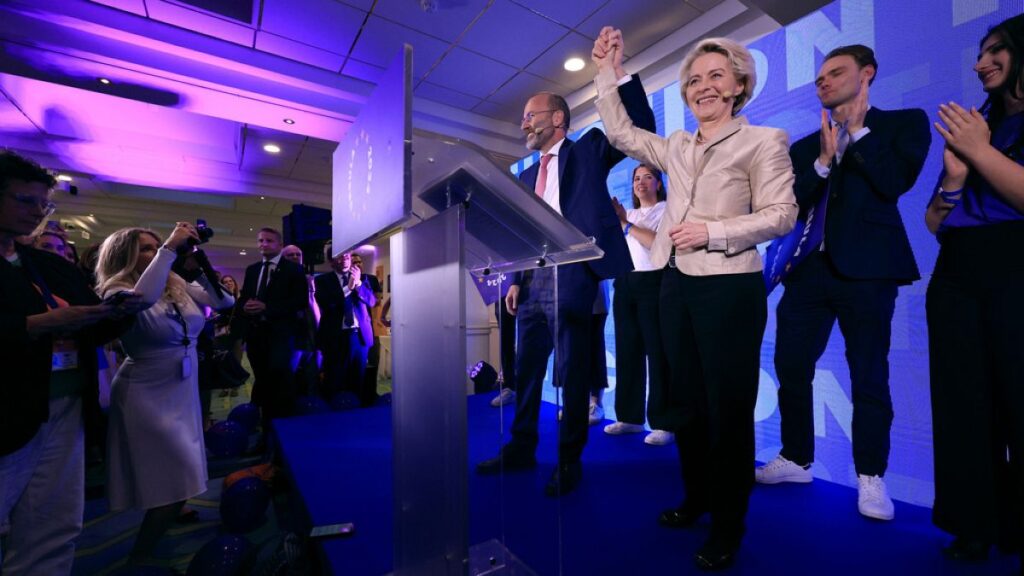The European elections, along with polls in Portugal and Austria, have shifted the political landscape to the right and far-right.
In 2024, Europe saw a clear shift to the right, with both the European elections and national polls in France, Portugal, Belgium, and Austria showing a move towards right-wing and extreme-right politics. The shift appears to have common roots across several countries.
Pascal Delwit, a professor of political science at the Université libre de Bruxelles (ULB), told Euronews that this trend is due to the growing appeal of radical right-wing parties. He explained that many voters feel neglected and believe they have been left to fend for themselves.
“These voters also express concerns about immigration, with some feeling that ‘migratory flows are now too great’ and contribute to keeping wages too low,” Delwit said.
The expert believes this is not a short-term trend but rather a political movement that has been building for nearly two decades.
“This is a movement that has been evolving for almost twenty years, and it’s showing a steady upward trend. More radical right-wing parties are either in government or supporting certain administrations,” he added.
European institutions
In the June 2024 European elections, the centre-right European People’s Party (EPP) made a breakthrough, securing 188 out of the 720 seats in the European Parliament. They were followed by the Social Democrats (S&D) with 136 seats and the far-right Patriots for Europe group, which took 84 seats.
The shift has moved the political spectrum towards the right and extreme right, with the majority of MEPs now sitting on the right side of the hemicycle. These include the EPP, the European Conservatives and Reformists Group (ECR), the Patriots for Europe, and the Europe of Sovereign Nations.
The “cordon sanitaire” — a longstanding effort to prevent the far-right from gaining power — has effectively collapsed. With no single political majority in the European Parliament, the EPP now finds itself in a position to form alliances with the Social Democrats, the Liberals, and even radical right-wing parties.
The new European executive, which took office on 1 December, also leans to the right. Twelve of the 27 European Commissioners, including President Ursula von der Leyen, are officially affiliated with the EPP.
Electoral victories
In addition to the European elections, the right and far-right made significant gains in several national elections across Europe. In Austria, Herbert Kickl of the far-right FPÖ led the September parliamentary elections with 29% of the vote, marking the best result for the far-right in the country since the end of World War II.
In Belgium, the conservative Flemish party N-VA topped the June parliamentary elections, followed by the far-right Flemish party Vlaams Belang. Six months later, negotiations have still not resulted in the formation of a federal government.
In Portugal, the political landscape shifted rightward when the centre-right opposition, led by Luis Montenegro of the Democratic Alliance, won the March parliamentary elections.
In France, the far-right National Rally (RN) secured the most votes in the European elections, with over 31%. RN also led the first round of early parliamentary elections with more than 29% of the vote. However, the Republican Front, a coalition of the left-wing Nouveau Front Populaire (NFP) and centrists managed to block RN’s path to power in the second round by rallying support from third-place candidates.
Decline of the left
While the left has lost ground across Europe it remains in power in Denmark, Spain, Lithuania, Malta, Romania, Slovenia, and Slovakia.
In Romania, the left managed to win the parliamentary elections despite a strong showing by the far-right. However, the presidential election was annulled by the Constitutional Court amid allegations of Russian interference supporting the nationalist candidate, Călin Georgescu.
All eyes are now on Germany, where the collapse of Chancellor Olaf Scholz’s coalition (Social Democrat) is expected to lead to early elections at the end of February. The election may signal a key turning point for 2025.
The rise of right-wing politics in Europe mirrors the dynamics seen in the United States, where Donald Trump’s victory is part of a broader trend, though shaped by different factors on either side of the Atlantic.
Read the full article here

















